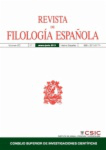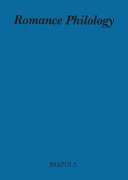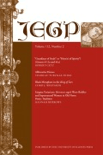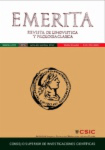
REVISTA DE FILOLOGIA ESPANOLA
metrics 2024
Exploring the Depths of Spanish Linguistics and Literature
Introduction
REVISTA DE FILOLOGIA ESPANOLA is a distinguished academic journal dedicated to the fields of linguistics and literature, published by the CONSEJO SUPERIOR INVESTIGACIONES CIENTIFICAS (CSIC) since 1954, and has been an Open Access journal since its inception. Situated in Madrid, Spain, this journal has emerged as a crucial platform for the dissemination of scholarly research, with notable rankings including Q2 in Linguistics and Language and Q1 in Literature and Literary Theory as of 2023. The journal's commitment to fostering academic dialogue is reflected in its impressive Scopus rankings, including a 79th percentile in the Arts and Humanities for Literature and Literary Theory. Covering a wide range of topics from linguistic theory to literary critique, REVISTA DE FILOLOGIA ESPANOLA is essential reading for researchers, professionals, and students alike, providing valuable insights and cutting-edge research in the ever-evolving landscape of Spanish philology.
Metrics 2024
 0.20
0.20 0.30
0.30 0.30
0.30 9
9Metrics History
Rank 2024
Scopus
JCI (Web Of Science)
Quartile History
Similar Journals

Rhythmica-Revista Espanola de Metrica Comparada
Deciphering the Language of Meter Across CulturesRhythmica-Revista Espanola de Metrica Comparada, published by the UNIV NACL EDUCACION & DISTANCIA-UNED, is a premier academic journal specializing in the comparative study of metrics within the realm of Hispanic literature and beyond. With the ISSN 1696-5744, this journal serves as a vital platform for researchers, professionals, and students to explore the intricacies of rhythm and meter in comparative contexts. Located in Madrid, Spain, it aims to foster interdisciplinary exchange and stimulate innovative research in the field of metrical studies. Although open access options are limited, the journal remains committed to distributing high-quality, peer-reviewed articles that significantly contribute to the academic discourse surrounding metrics. As an essential resource for those engaged in literary studies, Rhythmica continues to amplify critical voices and provides insightful analyses that advance the understanding of poetic structures across diverse languages.

Caplletra
Unveiling Insights into Language's IntricaciesCaplletra is a distinguished open-access journal dedicated to the field of linguistics and language studies, published by PUBL ABADIA MONTSERRAT since its inception. Based in Barcelona, Spain, this journal has been a vital resource for researchers, professionals, and students engaged in the intricate explorations of language and its applications since its transition to open access in 2005. Despite its current quartile ranking of Q4 within the Linguistics and Language category as of 2023, Caplletra continues to serve as an inclusive platform, fostering a dialogue that encourages a diverse range of scholarly contributions. Covering an expansive scope in the converged years from 2018 to 2024, it plays a crucial role in disseminating innovative research and insights. With its ISSN 0214-8188 and E-ISSN 2386-7159, Caplletra is committed to making academic work accessible to all, enhancing the landscape of linguistic scholarship and reflecting the evolving nature of language studies.

RILCE-Revista de Filologia Hispanica
Exploring the Depths of Linguistic and Literary StudiesRILCE-Revista de Filologia Hispanica is a distinguished academic journal published by the Universidad de Navarra, serving as a pivotal platform for scholarship in the field of Hispanic Philology. Established in 2008 and ongoing through 2024, RILCE stands out in the academic community with a robust reputation reflected in its 2023 ranking; it holds Q2 status in Linguistics and Language and Q1 in Literature and Literary Theory. The journal is indexed in Scopus, where it ranks 165th out of 1106 in Literature and Literary Theory, showcasing its significant impact with an 84th percentile ranking. Located in Pamplona, Spain, RILCE aims to foster critical dialogues and disseminate innovative research that advances the understanding of linguistic and literary studies, making it an essential resource for researchers, professionals, and students alike. Although specific open access options may be limited, RILCE remains committed to enriching the academic dialogue within its disciplines.

Minerva-Revista de Filologia Clasica
Exploring the depths of linguistics and literature.Minerva-Revista de Filologia Clasica, an esteemed academic journal published by the Universidad de Valladolid, is a pivotal resource in the fields of Classics, Linguistics, and Literature. With its ISSN 0213-9634 and E-ISSN 2530-6480, this journal has been championing open access since 2017, making high-quality research accessible to a global audience. Based in Valladolid, Spain, Minerva is dedicated to the exploration and dissemination of scholarly work related to classical philology, offering a platform for the exchange of ideas among researchers, educators, and students alike. Recognized in the 2023 category quartiles as Q3 in Classics and Q4 in Linguistics and Language, this journal provides valuable insights and contributes significantly to its fields, allowing authors and readers to engage with important discussions and innovative perspectives. As the academic landscape evolves, Minerva continues to adapt, fostering a vibrant community committed to the advancement of knowledge in antiquity and its linguistic dimensions.

Revista Argentina de Historiografia Linguistica
Advancing the study of linguistic heritage.Revista Argentina de Historiografia Linguistica, an esteemed academic journal based in Argentina, is dedicated to advancing the field of linguistic historiography. Published by the REVISTA ARGENTINA HISTORIOGRAFIA LINGUISTICA-RAHL, this journal serves as a vital platform for researchers, professionals, and students interested in the study of language history and the evolution of linguistic thought. With a commitment to open access, it promotes widespread dissemination of knowledge, ensuring that valuable insights reach a global audience. The journal aims to publish high-quality, peer-reviewed articles that explore various dimensions of linguistics, including historical language development, sociolinguistics, and language policy. By engaging with a diverse array of topics and methodologies, Revista Argentina de Historiografia Linguistica not only enhances academic discourse within the linguistics community but also fosters interdisciplinary collaboration, making it indispensable for those seeking to deepen their understanding of linguistic heritage and its contemporary significance.

Filologia Mediolatina
Unraveling the Threads of Language and CultureFilologia Mediolatina is an esteemed academic journal dedicated to the study of Medieval Latin philology, published by SISMEL EDIZIONI GALLUZZO in Italy. With an ISSN of 1124-0008, this journal provides a critical platform for researchers, professionals, and students to explore the intricate relations between language, culture, and textual analysis in the medieval period. Although its impact factor is not specified, Filologia Mediolatina falls within the Q4 category in the Linguistics and Language field as of 2023 and holds a notable rank in the arts and humanities sector, highlighting its niche yet vital role in the academic community. The journal offers insights into linguistic evolution and historical texts, making it a valuable resource for those engaged in these disciplines. It has continued to publish relevant articles from 2015 to 2023, contributing to scholarly discussions and enriching the knowledge base in medieval studies.

ROMANCE PHILOLOGY
Fostering Innovation in Language and Literary ExplorationROMANCE PHILOLOGY is a distinguished academic journal dedicated to the exploration of language, literature, and linguistic theory within the Romance language family. Published by BREPOLS PUBL, it offers a platform for scholars, researchers, and practitioners to disseminate their findings and engage with the latest developments in these fields. The journal's impact factor reflects its standing, positioned within the Q4 category in Linguistics and Language and Q3 in Literature and Literary Theory for 2023, making it an essential resource for those studying Romance philology. Although coverage in Scopus was discontinued in 2021, the journal maintains a commitment to rigorous academic standards and comprehensive peer-review processes. With a broad scope encompassing theoretical and practical aspects of Romance languages and literatures, ROMANCE PHILOLOGY invites contributions that push the boundaries of knowledge and enrich the academic dialogue surrounding these vital areas of study. For those passionate about linguistic and literary pursuits, this journal stands as a significant gateway into the evolving discourse of Romance studies.

JOURNAL OF ENGLISH AND GERMANIC PHILOLOGY
Fostering Interdisciplinary Dialogue in LinguisticsJournal of English and Germanic Philology, published by University of Illinois Press, stands as a prestigious forum for scholarly discourse in the fields of linguistics and literary studies. With its ISSN 0363-6941 and an impressive impact factor aligning it within the Q1 and Q2 quartiles in key academic categories, this journal delves into nuanced explorations of both the English and Germanic languages, enriching the understanding of language and its literary frameworks. The journal aims to foster interdisciplinary dialogue, offering cutting-edge research that appeals not only to linguists and literary theorists but also to educators and cultural historians alike. Although the journal is not open access, its contributions are essential for anyone keen on enhancing their knowledge of linguistic phenomena and literary narratives from these influential linguistic traditions. With a commitment to publishing innovative and rigorous scholarship, the Journal of English and Germanic Philology is a vital resource for academics seeking to advance their work in language and literature.

Emerita
Fostering Scholarly Excellence in Language and LiteratureEmerita is a distinguished academic journal published by CONSEJO SUPERIOR INVESTIGACIONES CIENTIFICAS-CSIC in Spain, focusing on the fields of Classics and Linguistics. With its roots dating back to 1971, Emerita has established itself as an open-access publication since 1974, ensuring broad accessibility for researchers, professionals, and students alike. This journal's commitment to scholarly excellence is reflected in its 2023 Q2 classification in Classics and Q3 in Linguistics and Language, making it a vital resource for those engaged in classical studies and language research. In the Scopus rankings, it holds respectable standings, including Rank #76/170 in Arts and Humanities Classics and Rank #695/1088 in Language and Linguistics, demonstrating its significant presence and influence within these academic disciplines. The editorial office is located at Editorial CSIC, C/VITRUVIO 8, 28006 MADRID, SPAIN, where it continues to curate important research that contributes to the understanding and appreciation of classical literature and linguistic theory.

Dacoromania
Pioneering open access to critical scholarship.Dacoromania, published by the esteemed EDITURA ACAD ROMANE, is an Open Access academic journal that has been contributing to the fields of Linguistics, Language, Literature, and Literary Theory since 2011. With a mission to foster scholarly dialogue and facilitate knowledge dissemination, the journal enables researchers, professionals, and students to access a wealth of innovative research and critical scholarship without barriers. Although currently classified in the Q4 quartile for its categories in Linguistics and Literature, Dacoromania aspires to enhance its visibility and impact within these disciplines, providing a platform for emerging voices and ideas from Romania and beyond. The journal is openly accessible and invites submissions that push the boundaries of linguistic and literary studies, ensuring a vibrant exchange of thought in a rapidly evolving academic landscape.